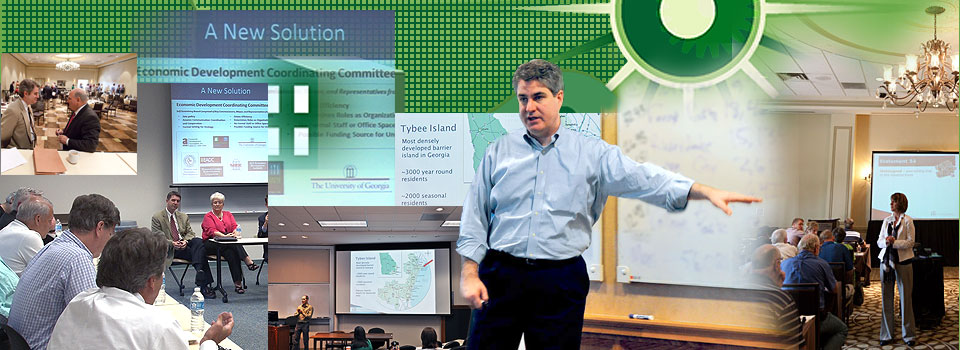Each year, thousands of government officials and staff wanting to improve their knowledge and skills turn to continuing education opportunities offered by the Carl Vinson Institute of Government, a UGA Public Service and Outreach unit. During 2013 alone, the Institute of Government provided online and traditional training and education more than 76,000 times to local and state elected and appointed officials and personnel across Georgia.
One of the most well known of these comprehensive training opportunities is the Biennial Institute for Georgia Legislators, a nationally recognized program that since 1958 has been providing new legislators an opportunity to join veterans in preparing for the upcoming session of the General Assembly. Program topics anticipate the session’s most pressing issues, and from the governor’s strategic plan on down, it is clear that none is more important than economic development.
UGA is responding to this statewide need with expanded economic development programming. Training that helps improve governance at all levels is foundational to preparing communities for success, and some of the Institute of Government’s programs, like the comprehensive local finance officer certification program that helps promote sound financial practices, are especially relevant to the economic health and well-being of Georgia’s communities. Numerous other courses are designed to help improve knowledge and skills at all levels. Training opportunities can also be customized to meet the specific needs a government identifies.
Helping Georgia prosper is the common denominator in all Institute of Government services, from training to survey research to customized assistance. The same can be said of the work of all eight Public Service and Outreach programs, whether providing economic development services directly or indirectly through helping communities become stronger and better able to capitalize on opportunities. These units put UGA resources and expertise to work daily to help create jobs, develop leaders and address some of the state’s most pressing issues.
With economic development at the top of that list of issues, Public Service and Outreach is expanding its programming, too. In December, Public Service and Outreach launched a new training initiative to help strengthen economic development professionals’ understanding of available financing options and incentives. The course, titled Financing Economic Development and Deal Structuring, debuted at the UGA Center for Continuing Education Hotel and Conference Center with nearly 40 economic development professionals attending. A second training session is being offered on Feb. 5 in Tifton.
The course, presented by economic development expert Rob Gordon, a faculty member at the Institute of Government, is designed to help economic development professionals improve their understanding of traditional financing options and to familiarize them with nontraditional resources and incentives. A comprehensive training agenda focuses on local financing options including bonds, overlooked and underutilized funding opportunities, incentives that can be used to close financial gaps, and tools for valuing financing and incentive packages.
“This course provides a forum for economic development professionals to discuss a variety of financing components and mechanisms, and their relevance in our respective communities,” said Rusty Haygood, economic development director for Oconee County.
Successful economic development professionals understand how financial packages are structured and the importance of financing options in securing new business development and retaining existing business. Course participants learn how to access available funding sources and incentive programs, and how to pull multiple resources together to close the deal.
Shane Short, executive director of the Development Authority of Walton County, attended the Athens training session and said, “The training on various financing options for economic development was a tremendous asset for me, especially the third-party options that I have never explored and never knew about.”
Economic development professionals who understand how to secure funding and other incentives from a variety of local, state and federal resources are better equipped to help their community bridge the gap between a company’s private funding sources and the overall financial requirements necessary for locating or expanding a business.
